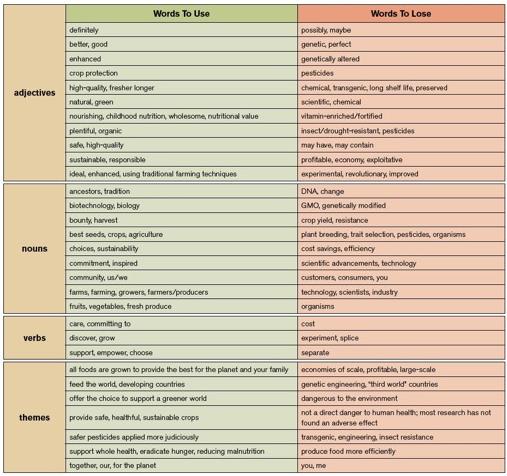Blog Archives
Biotech corporates, allied with state agencies, attempt to ‘educate’ British consumers
Posted by admin
In the US corporate tradition: Rebecca Mark was said to have ‘educated’ Indian decision-makers about Enron, with $60 million.
 Britain’s special friend recently updated an ‘educational’ Food Biotechnology document.
Britain’s special friend recently updated an ‘educational’ Food Biotechnology document.
It was produced ‘under a partnering agreement’ between the United States Department of Agriculture (USDA), Foreign Agricultural Service (FAS) and the International Food Information Council (IFIC) Foundation.
Its mission: “to provide vital information to communicators on food biotechnology”.
Note that, rather than referring to GMOs or genetic engineering the preferred terminology is now “biotechnology”. This report goes further, elaborating on the use of language to manipulate the undecided and giving a useful chart (below).
Words to use, words to lose
This vital information to communicators on food biotechnology, to all hoping to advance the growing of GM crops, would include IFIC’s funders, in particular: Bayer CropScience, Cargill, The Coca-Cola Company, Dow AgroSciences, DuPont, Monsanto, Nestlé, PepsiCo, Tate & Lyle and Unilever.
This chart, which is more clearly reproduced on page 12 of the document, is followed by a note: “To communicate with impact . . . your words must be uniquely yours. The intent of these lists is to raise your awareness of words that have been found to evoke negative or positive reactions from consumers. Although Words to Lose may sometimes be necessary, an understanding of their potential impact on certain groups will aid in more productive conversations with those groups”.
The ‘Hidden Persuaders’ . . .
–
Next: A ‘full-frontal’ attack on NGOs which oppose the growing of GM crops as presently developed
Posted in Conflict of interest, Corporate political nexus, Lobbying, Media, Vested interests
Tags: Bayer CropScience, Cargill, Dow AgroSciences, Dupont, Enron, Food biotechnology, GM Crops, IFIC, International Food Information Council, Monsanto, Nestlé, PepsiCo, Tate & Lyle, The Coca-Cola Company, Unilever, United States Department of Agriculture, USForeign Agricultural Service
The revolving door yet again: European Food Safety Agency compromised by links with GM industry
Posted by admin
Yesterday The Grocer reported that Dr Banati, was asked to resign over a potential conflict of interest between her work with EFSA and her plan to become executive and scientific director at the International Life Sciences Institute, a pro-GM body where she sat on the board until 2010.
 In 2010, French Green MEP José Bové called for the resignation of the chair of the management board of European Food Safety Agency (EFSA), Dr. Diana Banati, over a conflict of interest scandal.
In 2010, French Green MEP José Bové called for the resignation of the chair of the management board of European Food Safety Agency (EFSA), Dr. Diana Banati, over a conflict of interest scandal.
He outlined the details of Dr Banati’s extensive links to the food industry, which completely undermined the need for independence at the EFSA.
Among its other roles, the EFSA is responsible for assessing genetically modified organisms as part of the EU approval process, for which it has been frequently criticised.
 According to José Bové, Dr Banati was a member of the board of the International Life Science Institute, an organisation representing a myriad of businesses, including Monsanto, Syngenta, Dupont, Nestlé and Kraft, among others, which has a history of lobbying for the interests of the food industry.
According to José Bové, Dr Banati was a member of the board of the International Life Science Institute, an organisation representing a myriad of businesses, including Monsanto, Syngenta, Dupont, Nestlé and Kraft, among others, which has a history of lobbying for the interests of the food industry.
ILSI describes itself as a ‘non-profit, worldwide organisation whose mission is to provide science that improves public health and well-being.’
EFSA had already faced one conflict of interest controversy, with the revolving door case of GM regulator Suzy Renckens who moved from EFSA to food industry giant Syngenta.
The Mail Online reports that Green campaigners are demanding that any decisions made by EFSA to approve GM crops and food in recent years should be revoked pending further investigation.
